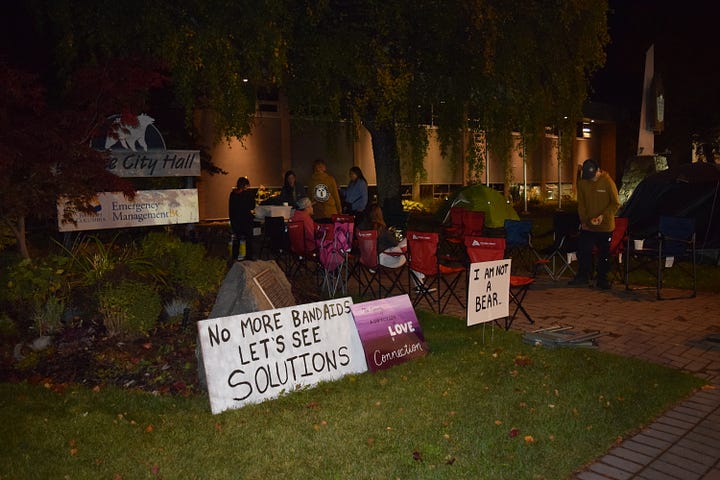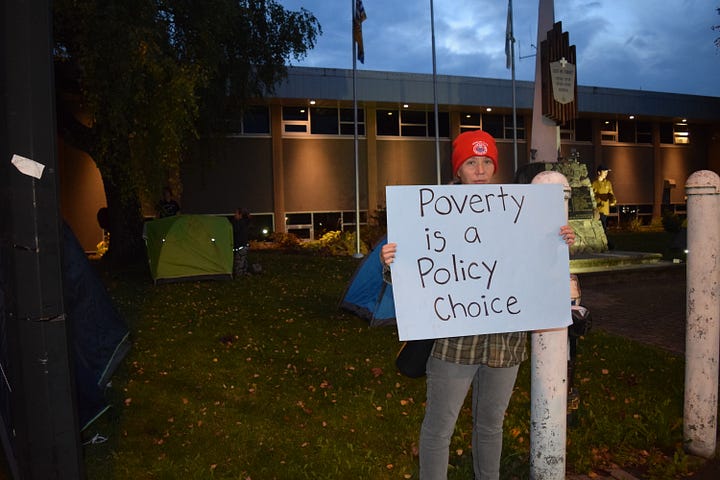Advocates protest homelessness with Terrace City Hall sleep-out
Terrace's homelessness surges from 96 people in 2018 to 156 this year


In a effort to draw attention to the struggles of the city’s rising homeless population, advocates from the Kermode Friendship Society staged their second annual overnight demonstration in front of Terrace City Hall on Wednesday.
Kermode Friendship Society Outreach and Highway Monitor Team Lead Terea Roberge emphasized that the demonstration is held in conjunction with Homelessness Action Week. Advocates spent the night on the streets to symbolize the challenges faced by many in the community.
“The homelessness issue isn't vanishing in our community,” Roberge said. “Our efforts are vital, but the resources we have access to just aren’t enough.”
“Last year we did have one of our community members die. He froze to death in a tent,” said Roberge. “There were promises made and a presumption that they’re going to do things and they still haven’t. Winter’s coming again, so we decided that we’re just going to keep doing this until something happens.”
“It’s hard to get anyone‘s attention when no one listens to us,” Roberge said.
She highlighted that although a city bylaw permits sleeping in tents on municipal property from 7:00 p.m. to 9:00 a.m., the enforcement is dehumanizing.
“There's a lack of understanding about how hard it is to wake up at 9:00 a.m. when a bylaw officer is yelling at you to get off the property,” Roberge said. “This year, we're going to video ourselves and the process — after freezing our butts off all night — of packing up while someone's yelling at us to leave.”
“We can’t record our clients in that situation because they’re vulnerable, so we’re going to do that for ourselves so we can demonstrate,” Roberge said.
Roberge spent the night outside using only the supplies Kermode can afford to provide to its clients, which consists of a yoga mat, a fleece blanket, an emergency foil blanket and a poncho.
Drawing from her own harrowing experiences of homelessness during her teenage years in Edmonton, Roberge emphasized the importance of her team's work, many of whom have faced homelessness themselves.
“I have lived-experience, which is why I'm so passionate about my work,” Roberge said. “I know what it feels like to sleep on a sidewalk or in an abandoned house. I know what it feels like to be drowning in my addictions. And I know what it feels like to recover and to prove everyone wrong.”
Roberge’s children were among the protesters, including her teenaged son, who is the same age as Roberge when she was homeless.
“My kids are very attuned to what goes on in the community because of what I do,” Roberge said. “It’s good for them because they can teach their friends and maybe our future generations will have bigger hearts.”
“We do have youth on our streets here in Terrace. And there is no shelter that they’re allowed to go to,” said Roberge. “When we do find youth, there is absolutely nothing we can do. And that’s a huge gap our community has been facing for a long time. Organizations don’t want to touch it because there’s so much more liability involved.”
“There was a very famous statement, in my opinion, about homeless people being a bad bear problem,” Roberge said. “You shoot them or relocate them, and that’s what really stirred the pot and the emotions for all of us, and gained a lot of attention, which is why we have the ‘I am not a bear’ sign.”
“I love my community. The people that we work with on the daily have taught me languages, they’ve taught me culture,” Roberge said. “There’s fishermen, there’s engineers — you don’t know who’s on the streets unless you give them a chance. They’re brilliant and I’ve learned so much from them.”
“My whole team at Kermode Friendship Society comes from lived experience,” Roberge said. “I think it's important to realize that we're in a place of privilege now and it's good for the community to see that you overcome, not matter how far into homelessness and addiction you are, or for how long.”
Tensions last year against the expansion of Ksan Society's homeless shelter galvanized advocates, leading to the inception of the sleep-out event. The hope was to foster empathy among the public and those in power towards the homeless community, and galvanize support for more housing for the homeless population.
“My goal and mission would be to create housing for the homeless,” Roberge said. “Having a space where people can go and work on their skills, recovery, or even just be safe and warm, or cool off in the heat would be amazing.”
Roberge said she’s presently drafting a proposal for a pilot program consisting of six tiny homes, complete with amenities such as laundry, showers, and communal spaces for essential services and relaxation. She notes that there are success stories with this model throughout the province, the country and even internationally.
“Putting a space together and having it self-governed — where residents make their own rules and follow them, evicting those that aren't following said rules — is working everywhere it has been put in place,” Roberge said. “That's something I would like to see in Terrace.”
“It would be a space where all these resources — where all of us that work frontline roles and on the street could meet up and easily locate someone — would be,” Roberge said. “They could share a meal, watch TV, do normal things that regular people take for granted, including watching some Netflix and lounging around because these people don't have that opportunity right now.”
“Treating them like human beings and giving them access to their human rights really makes a difference in changing someone's view,” Roberge said.
“Kicking people off municipal property takes away their dignity and their pride,” Roberge said. “It's a really defeating process and I remember that feeling very well. As someone who watches it happen now, it's horrible and depressing to see how much the community takes advantage of people and ignores their presence.”
B.C.’s latest homeless count highlighted an unsettling growth in Terrace’s homeless figures. While in 2018, the number stood at 96, it surged to 156 this year, despite a brief dip in between. However, Roberge suggests these numbers are an underestimation. Many, she says, are “hidden homeless,” living in cramped motels or couch surfing.
Last year’s demonstration during Terrace’s municipal elections saw some politicians showing support. Roberge hopes that such actions can be a step towards real change, saying, “Understanding and empathy are crucial. The stereotype that people choose homelessness needs debunking.”
“If people in positions of power experienced what it's like to sleep outside, I think they could better emphasize with those living on the street,” Roberge said. “They could use that perspective to not refer to access to an outhouse as 'red carpet treatment,' as were the famous words from one of our city councillors last year.”
“Perspective and privilege come into it a lot,” Roberge said.
A crucial part of the solution, according to Roberge, lies in improving access to recovery and rehabilitation facilities. The current wait time for detox treatments stands at an agonizing six months, hindering many who are ready for change.
“On-demand treatment and housing post-recovery in northern B.C. would be transformative.”


